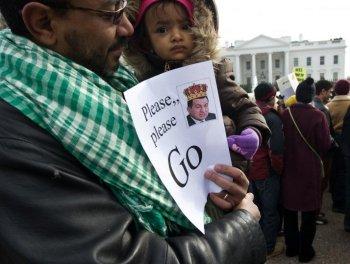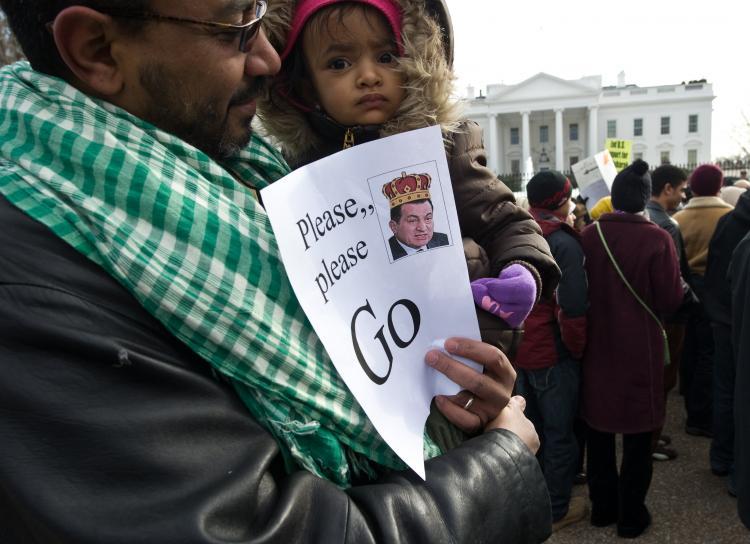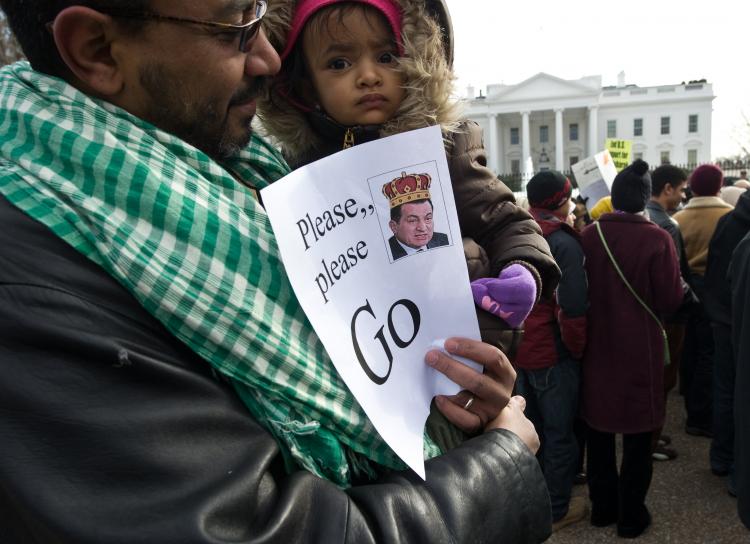WASHINGTON—Far from their ancient desert country, the Egyptian Association for Change (EAC) gathered outside the White House in the snow to demonstrate in support of the protests in Cairo.
In Cairo, mass street demonstrations led by Egypt’s youth have triggered widespread international concern that the unrest and potential ousting of Egypt’s 30-year President Hosni Mubarak will open the stage for an Islamic extremist group to come into power. In particular, the Muslim Brotherhood is seen as the main threat.
The Muslim Brotherhood, which has existed in Egypt since 1928 and was formally banned in 1954, has had a tumultuous history of assassinations and subsequent persecution by the Egyptian government. The Muslim Brotherhood are considered an extremist Islamic group and responsible for the assassination of Egypt’s prime minister in 1948, Egypt’s President Anwar Sadat in 1981, and an attempted assassination of Egypt’s President Gamal Nasser in 1954, who was still prime minister at the time.
Regarding concerns about the Muslim Brotherhood, young activists are quick to point out who started the protests.
“The Muslim Brotherhood did not organize this. This is a grassroots movement going on in Egypt,” said Hossam Mansour, 30, spokesperson for the group outside the White House.
Even while officially “banned” in Egypt, in 2005, Muslim Brotherhood candidates, running as “independents,” won 88 of the 454 (approximately 20 percent) parliament seats in Egypt. In the most recent elections in December 2010, however, they did not win a single seat in what was widely considered an election rigged by the Mubarak regime.
While clamping down on Islamists to gain public support, for decades, Mubarak’s government had attempted to frame the Muslim Brotherhood as the only alternative. Egyptians who supported Mubarak did so as an alternative to the Muslim Brotherhood.
“Egyptians are religious only on the cover as a result of what Saudi Arabia is doing,” said Amir Mansour, 30, one of the EAC activists outside the White House.
The extremist form of Islam penetrating Egypt in recent years is Salafi Islam (also called Wahhabi Islam), which is the prevailing form of Islam in Saudi Arabia.
According to Nasser Weddady, civil rights outreach director of the American Islamic Congress (AIS) and Hands Across the Middle East Support Alliance (HAMSA), “The government did everything to look the other way to facilitate their arrival,” referring to the Salafi movement fueled by funding from Saudi Arabia.
Mubarak leveraged the Salafis as a rival Islamic group to keep the Muslim Brotherhood in check, says Weddady.
Egypt has been a country of predominantly moderate Muslims, while the Salafis are even “more extreme than the Muslim Brotherhood,” says Weddady. He blames Mubarak for allowing the widespread and yet unwelcomed social change in Egypt.
“Right now, we all agree on what we don’t want—as long as it is a liberal alternative and we have plenty of them,” said D.C. activist Hossam Mansour, people like him will accept it. He then went on to list acceptable alternatives to Mubarak, like Noble Peace Prize winner Mohamed ElBaradie and Ayman Nour, leader of the El Ghad party, who spent three years in jail for his pro-democracy perspectives.
The protesters representing the mass Egyptian population—where the median age is 24—are trying to show that it is neither the current regime nor the Muslim Brotherhood that will be allowed to lead Egypt going forward.
According to Weddady, the Muslim Brotherhood has lost political credibility over the past years and, outside of “its imagination,” has no chance of or capability for governing a country like Egypt.
“Once ElBaradie became an alternative, I would say 80 percent of active Egyptians would agree on him as a real alternative,” said Amir Mansour.
Protests in Cairo have become a platform for Muslims, Christians, and all sectors of Egyptian society.
“There are tens of thousands of people chanting ‘long live Egyptian Muslims and Christians’ and calling for equality for all, Muslims, Christians, Jews,” explained activist Sherif Mansour, 30, “And atheists,” pitched in Hossam Mansour.
“You have to listen to the street, there is no Muslim Brotherhood in the street. It’s just Egyptians, liberal Egyptians,” said Sherif Mansour.
Over the past 30 years, Egyptians have only seen one leader and they want change. Today, it seems it does not matter who the next president will be. The main concern for Egyptians is forming a democratic system that, regardless of who is in power, will not be manipulated later on.
“As long as there is a system and everyone who is in the system abides by the rules of the game of democracy,” said Sherif Mansour.
Protesters in Egypt have vowed to continue demonstrating as long as Mubarak is in power. On Tuesday he announced that he would not run for re-election in September 2011, but that promise was not enough for protesters.
The loose coalition of opposition groups, the National Association for Change (NAC), comprising the El Ghad Party, Muslim Brotherhood, and April 6th Movement, have presented a group of demands. They include that Mubarak and his son relinquish power, the lifting of Emergency Law that suspends constitutional rights and grants wider powers of arrest, forming an interim government, and allowing 3–6 months to prepare for public elections for parliament and president.
Among some activists there is the concern that if the United States does not support Mubarak’s resignation and placement of an interim president, then perhaps the Muslim Brotherhood or other Islamists will be able to reach the people and gain leadership during the demonstrations.
Egyptian human rights activist Dalia Ziada, 29, currently protesting in Cairo, said in an interview predating the protests that the problem is the form of Islam that is applied today, referring to the ultra-conservative Islam coming from Saudi Arabia.
“The Islam we have today is exported from other regions,” she said calling it “Bedouin Islam.” A woman is a sexual object of pleasure covered from head to toe and always comes second, explained Dalia, a master’s student in international relations with the Fletch School of Law and Diplomacy at Tufts University.
Dalia was almost arrested for conducting and publishing a survey of 4,500 people across Egypt’s provinces. Her survey listed six potential candidates and showed that contender Ayman Nour was preferred over Mubarak.
One day, arriving at her office in downtown Cairo, she saw police vehicles outside her building so she tweeted from the rooftop of a nearby building that they had come to arrest her. She phoned Egyptian security to ask why they were trying to arrest her but they did not return her call. Instead she received a call from the U.S. embassy who assured her that everything would be okay.
“In my country I am protected by Americans,” she said. These security forces are protecting the regime not the citizens, she said.
U.S. interests in Egypt and their support of the military are strong. According the U.S. State Department website, Egypt has received $1.3 billion annually in military aid since 1979, following the Egypt-Israeli Peace Treaty, and $28 billion since 1978 in economic and development aid.
In Cairo, mass street demonstrations led by Egypt’s youth have triggered widespread international concern that the unrest and potential ousting of Egypt’s 30-year President Hosni Mubarak will open the stage for an Islamic extremist group to come into power. In particular, the Muslim Brotherhood is seen as the main threat.
The Muslim Brotherhood, which has existed in Egypt since 1928 and was formally banned in 1954, has had a tumultuous history of assassinations and subsequent persecution by the Egyptian government. The Muslim Brotherhood are considered an extremist Islamic group and responsible for the assassination of Egypt’s prime minister in 1948, Egypt’s President Anwar Sadat in 1981, and an attempted assassination of Egypt’s President Gamal Nasser in 1954, who was still prime minister at the time.
Regarding concerns about the Muslim Brotherhood, young activists are quick to point out who started the protests.
“The Muslim Brotherhood did not organize this. This is a grassroots movement going on in Egypt,” said Hossam Mansour, 30, spokesperson for the group outside the White House.
Even while officially “banned” in Egypt, in 2005, Muslim Brotherhood candidates, running as “independents,” won 88 of the 454 (approximately 20 percent) parliament seats in Egypt. In the most recent elections in December 2010, however, they did not win a single seat in what was widely considered an election rigged by the Mubarak regime.
While clamping down on Islamists to gain public support, for decades, Mubarak’s government had attempted to frame the Muslim Brotherhood as the only alternative. Egyptians who supported Mubarak did so as an alternative to the Muslim Brotherhood.
“Egyptians are religious only on the cover as a result of what Saudi Arabia is doing,” said Amir Mansour, 30, one of the EAC activists outside the White House.
The extremist form of Islam penetrating Egypt in recent years is Salafi Islam (also called Wahhabi Islam), which is the prevailing form of Islam in Saudi Arabia.
According to Nasser Weddady, civil rights outreach director of the American Islamic Congress (AIS) and Hands Across the Middle East Support Alliance (HAMSA), “The government did everything to look the other way to facilitate their arrival,” referring to the Salafi movement fueled by funding from Saudi Arabia.
Mubarak leveraged the Salafis as a rival Islamic group to keep the Muslim Brotherhood in check, says Weddady.
Egypt has been a country of predominantly moderate Muslims, while the Salafis are even “more extreme than the Muslim Brotherhood,” says Weddady. He blames Mubarak for allowing the widespread and yet unwelcomed social change in Egypt.
“Right now, we all agree on what we don’t want—as long as it is a liberal alternative and we have plenty of them,” said D.C. activist Hossam Mansour, people like him will accept it. He then went on to list acceptable alternatives to Mubarak, like Noble Peace Prize winner Mohamed ElBaradie and Ayman Nour, leader of the El Ghad party, who spent three years in jail for his pro-democracy perspectives.
The protesters representing the mass Egyptian population—where the median age is 24—are trying to show that it is neither the current regime nor the Muslim Brotherhood that will be allowed to lead Egypt going forward.
According to Weddady, the Muslim Brotherhood has lost political credibility over the past years and, outside of “its imagination,” has no chance of or capability for governing a country like Egypt.
“Once ElBaradie became an alternative, I would say 80 percent of active Egyptians would agree on him as a real alternative,” said Amir Mansour.
Protests in Cairo have become a platform for Muslims, Christians, and all sectors of Egyptian society.
“There are tens of thousands of people chanting ‘long live Egyptian Muslims and Christians’ and calling for equality for all, Muslims, Christians, Jews,” explained activist Sherif Mansour, 30, “And atheists,” pitched in Hossam Mansour.
“You have to listen to the street, there is no Muslim Brotherhood in the street. It’s just Egyptians, liberal Egyptians,” said Sherif Mansour.
Over the past 30 years, Egyptians have only seen one leader and they want change. Today, it seems it does not matter who the next president will be. The main concern for Egyptians is forming a democratic system that, regardless of who is in power, will not be manipulated later on.
“As long as there is a system and everyone who is in the system abides by the rules of the game of democracy,” said Sherif Mansour.
Protesters in Egypt have vowed to continue demonstrating as long as Mubarak is in power. On Tuesday he announced that he would not run for re-election in September 2011, but that promise was not enough for protesters.
The loose coalition of opposition groups, the National Association for Change (NAC), comprising the El Ghad Party, Muslim Brotherhood, and April 6th Movement, have presented a group of demands. They include that Mubarak and his son relinquish power, the lifting of Emergency Law that suspends constitutional rights and grants wider powers of arrest, forming an interim government, and allowing 3–6 months to prepare for public elections for parliament and president.
Among some activists there is the concern that if the United States does not support Mubarak’s resignation and placement of an interim president, then perhaps the Muslim Brotherhood or other Islamists will be able to reach the people and gain leadership during the demonstrations.
Egyptian human rights activist Dalia Ziada, 29, currently protesting in Cairo, said in an interview predating the protests that the problem is the form of Islam that is applied today, referring to the ultra-conservative Islam coming from Saudi Arabia.
“The Islam we have today is exported from other regions,” she said calling it “Bedouin Islam.” A woman is a sexual object of pleasure covered from head to toe and always comes second, explained Dalia, a master’s student in international relations with the Fletch School of Law and Diplomacy at Tufts University.
Dalia was almost arrested for conducting and publishing a survey of 4,500 people across Egypt’s provinces. Her survey listed six potential candidates and showed that contender Ayman Nour was preferred over Mubarak.
One day, arriving at her office in downtown Cairo, she saw police vehicles outside her building so she tweeted from the rooftop of a nearby building that they had come to arrest her. She phoned Egyptian security to ask why they were trying to arrest her but they did not return her call. Instead she received a call from the U.S. embassy who assured her that everything would be okay.
“In my country I am protected by Americans,” she said. These security forces are protecting the regime not the citizens, she said.
U.S. interests in Egypt and their support of the military are strong. According the U.S. State Department website, Egypt has received $1.3 billion annually in military aid since 1979, following the Egypt-Israeli Peace Treaty, and $28 billion since 1978 in economic and development aid.





